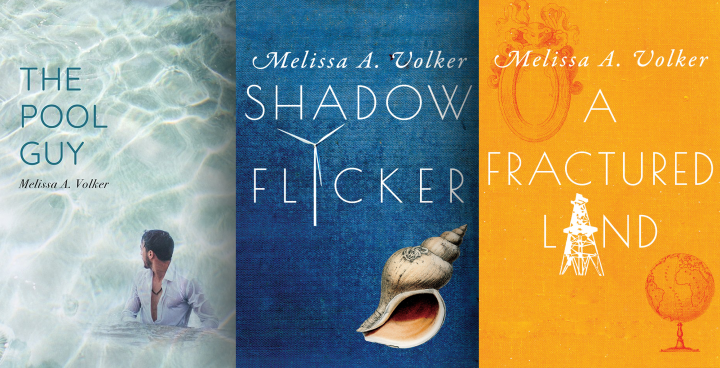Book review
Reading Romance: Melissa Volker’s twisty love stories with an environmental agenda

Romance stories have gotten a bad rap at times because of the negative stigmatisation associated with them. But if you want to read intelligent, carefully crafted love stories with a twist and a focus on social issues and the environment, Volker has definitely got you covered.
“The cold that settled in the hollow of the little desert town was bitter. It spread out its frosty bedroll and tucked everyone in for a chilly night. The main street that sliced up through the town’s centre had miles and miles of highway behind it, like a snake, making its way through a strange wasteland.
“It wasn’t a desert of rolling dunes and date-filled oases, nor was it a desert of cacti and canyons. These were badlands, carpeted with dirt and furnished with scrub…
“The town huddled under the watchful eye of an imposing church that stopped the highway in its slither and split it in two. Whether you turned left or right, you couldn’t pass through without a spiritual thought.”
So begins Melissa Volker’s novel, A Fractured Land, a love story set in Graaff-Reinet in the Eastern Cape.
Lexi Taylor’s husband has pulled a fast one by taking their money and disappearing into the ether. Broke and trying to pick up the pieces, Lexi moves back home to her mother in Graaff-Reinet and gets a job singing at a local hotel bar. There, she meets an exhausted Carter O’Brien, who arrives one night at the hotel looking as if “he’d walked from the United States to Graaff-Reinet”. Carter is a geologist from Texas and is in South Africa to explore the possibility of fracking for shale gas in the South Western Karoo Basin.
Volker’s tales are carefully spun, a weave of gossamer thread of the finest ilk. Her books take a while to write and she has an uncanny ability to transpose the reader into time and place.
In A Fractured Land, we are able to visualise the arid landscape, the sweat of hot nights is tangible, and we can smell the lingering scent of wisteria on dry, balmy days. Volker is adept at breathing life into the South African landscape, making it jump off the page to embed itself in the reader’s mind.
“Quite a lot of work goes into my books,” says Volker. “I have been working on my current novel for about three years. I’m quite fussy. I try hard to layer the characters, to make the dialogue work. I feel like each novel is taking longer – maybe I’ve become a harsher critic of my own work, or maybe I am learning the craft of writing more.”
The time that Volker invests in her writing is evident in her other books, Shadow Flicker (released in 2019) and The Pool Guy, a novella published in 2021. Attention to detail sets her work aside from other books in the genre, where some writers have managed to push out many books in a short time.
Volker’s writing stands out in its meticulous effort to cobble together a love story that is complex, exquisitely told and of a high calibre.
What also sets Volker apart is that both A Fractured Land and Shadow Flicker skillfully incorporate an attempt to pluck at the strings of environmental consciousness.
“I write about the environment because it’s an issue of concern to me. When writing the books, I thought about some of the social circles that I am in where these issues don’t even touch ground. I realised that one way of getting people to think about it is through fiction.
“Sometimes people are just so fatigued about bad news and watching it on TV. So I wanted to package it in a way that was palatable… in a way that raises awareness.”
In A Fractured Land, Volker dives into the muddy waters of hydraulic fracturing and its associated environmental challenges, but also the debate that comes with its potential to create economic opportunity. It is this lens, within which the issues are layered and complex, that stands out in Volker’s work.
She manages, through the narrative, to consider both the potential positive and negative repercussions of fracking. “Importantly, I don’t try to resolve complex social issues, because life is not like that. I don’t necessarily tie them up with a bow – I leave them there, resting and unresolved.”
Volker has an affinity for Graaff-Reinet, the setting of A Fractured Land. She fell in love with the small town in her teens when she took a bus to stay with a friend for a week.
“It really resonated with me. It was winter and you could feel the cold in the air. The environment stayed with me and I wanted to write about it. I also feel very strongly about fracking, because we live in a country where we have water challenges. We don’t have the resources to use water for hydraulic fracturing. There must be a better way – why not solar?
“But I also understand the Karoo, the socio-economic problems – if something can create employment, then there are two sides to the story.”

Author Melissa Volker. Image: Supplied
Volker researched some of the community meetings when fracking was being considered in Graaff-Reinet, and looked at, for example, consultations with local Khoisan leaders. Some of the substance of these meetings – weighing up the detrimental effects of fracking with that of the benefits to the community – are drawn on in the book.
In Shadow Flicker, Kate Peterson suffers from an anxiety disorder caused by a personal tragedy. Her boss unwittingly sends her on a renewable energy assignment to the site of her trauma, St Francis Bay in the Eastern Cape. Kate is sent to manage the environmental opposition to a planned wind farm. One day on the beach, she meets local vet Matthew Sykes, who is grieving the death of his wife. The chemistry between them is palpable, but the relationship is not without complications.
The book, as is the case with A Fractured Land, also has elements of a psychological thriller, with clever twists and turns woven into the story. Shadow Flicker brings to the fore how tension in communities can ratchet up when there are different, contested interests.
Violence erupts as the local community becomes increasingly hostile to the idea of a wind farm and things heat up when Kate starts receiving threats. The toll on Kate’s mental health is huge and it becomes difficult to hide it from others.
As with A Fractured Land, environmental issues are an important part of the storyline. Shadow Flicker was inspired by Volker’s experience of and affinity for St Francis Bay.
“My family had a little cottage on the Krom River, on a nature reserve. The community there is very environmentally conscious. There are plants that you can’t remove when you’re doing construction. You can’t drive over parts of the estuary to launch your boat – they’re very strict about that sort of thing.
“But then there was a proposal from a wind farm developer to build a wind farm within sight of the nature reserve. The community went bananas. I really could not understand it – how could environmentally conscious people not want to support the development of a wind farm? Because they objected, it was not built. I thought, there’s a story here because it does not make sense – that people are environmentally conscious until it affects them.
“They call them nimbys (Not in My Back Yard) – basically, you can build a wind farm, but not where I have invested in my holiday house, because I don’t want to see it. This is what I’m passionate about and I had to write about it.”
Shadow Flicker won the Strelitzia Award in 2017, an award that recognises its skill, from the Romance Writers Organisation of South Africa (ROSA).
Volker’s latest book, The Pool Guy, is a short, sharp tale.
Lauren Jones is the fastidious manager of a spa at a hotel on the mountain overlooking the sea. She prides herself on running a first-class establishment. Things start going downhill when a new pool guy, Wyatt, shows up shirtless, strutting about as he cleans the pool.
Lauren is determined to run an “establishment steeped in honour and dignity” and in her mind, the pool guy does not fit into the picture. She tries to take him in hand, but he is languorous and laissez-faire and does not seem at all concerned by Lauren’s attempt to improve on his “refinement”.
The book is not long; it is a sliver of a thing that keeps you on your toes. It started out as an initiative of ROSA, which wanted to put together an anthology of romance stories. Volker wrote the book during lockdown. Her work as a beauty therapist slowed down, which meant she had more time to write, to escape into Lauren and Wyatt’s story. The idea for the book came about while she watched her husband raking leaves and making business calls at the same time.
“My husband was raking leaves during lockdown. I had never seen him working in the garden before. As he raked, he was on the phone talking about big construction projects. I watched this and thought, here’s an idea.
“I also wanted to write about a beauty therapist because it’s what I do. Some people think it’s a glamorous job. But, actually, the beauty therapist is working hard and she’s sweating… she has to stay neat, have her hair pulled back, and keep her nails short, keep her cool.”
Lauren Jones is one of Volker’s most vividly drawn characters. Her portrayal, her motivations, her complexity make it hard to believe that she, in fact, does not exist. “I go on an emotional journey with my characters – they make me laugh at times. Sometimes I feel sad for them. They become real and they’re deeply cathartic,” she explains.
Romance stories have gotten a bad rap at times because of the negative stigmatisation associated with them. Yet, as the Netflix series, Bridgerton, showed us, these are the stories that many women want to read. “I think there is an element of misogyny in this,” says Volker.
“The big question to think about is, does misogyny play a role in the value we attach to books? Does it play a role in deciding whether a book is menial or not? If women are enjoying romance, why is it stigmatised?”
ROSA holds the same view – that it is internalised misogyny which prompts people to denigrate the things liked by women. The organisation argues in its December 2021 newsletter that we have been conditioned to think that content generated by and for women lacks merit – that centering women’s pleasure is “trashy” or lacks merit.
We should not be judging books by the genre within which they fall. Instead, we should focus on the merits of the book – its plot, characters and the author’s technical and creative ability.
If you want to read intelligent, carefully crafted love stories with a twist and an environmental agenda, Volker has definitely got you covered. DM/ ML


















 Become an Insider
Become an Insider
Comments - Please login in order to comment.